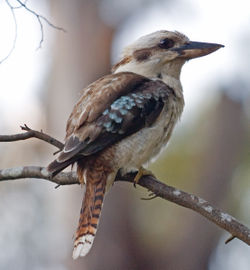Kookaburra
2007 Schools Wikipedia Selection. Related subjects: Birds
| iKookaburras | ||||||||||||
|---|---|---|---|---|---|---|---|---|---|---|---|---|
 Kookaburra.
|
||||||||||||
| Scientific classification | ||||||||||||
|
||||||||||||
|
|
||||||||||||
|
Kookaburras are very large terrestrial kingfishers native to Australia and New Guinea, the name a loanword from Wiradjuri guuguubarra, which is onomatopoeic of its call.
Kookaburras are best known for their unmistakable call which is uncannily like loud, echoing human laughter — good-natured, if rather hysterical, merriment in the case of the well-known Laughing Kookaburra (Dacelo novaeguineae); and maniacial, almost insane, cackling in the case of the slightly smaller Blue-winged Kookaburra (Dacelo leachii). The call has been immortalized as the "ooh ooh AHH AHH AHHH AHH AHH" cry that is part of the background audio in countless jungle movies, regardless of where the jungle in the movie is located.
Classification and species
There are four known species of Kookaburra found in Australia, New Guinea and the Aru Islands.
Unusually for close relatives, the Laughing and Blue-winged species are direct competitors in the area where their ranges overlap. This suggests that the two species, though having common stock, evolved in isolation (possibly during a period when Australia and New Guinea were more distant — see Australia-New Guinea) and were only brought back into contact in relatively recent geological times.
Trivia
- "Olly" the Kookaburra was one of the three mascots chosen for the Sydney 2000 Olympics. The other mascots were the Echidna Millie and the Platypus Syd.
- Australia has dedicated a series of coins to the Kookaburra since 1990.
- There is also a Kookaburra nursery rhyme in Australia.